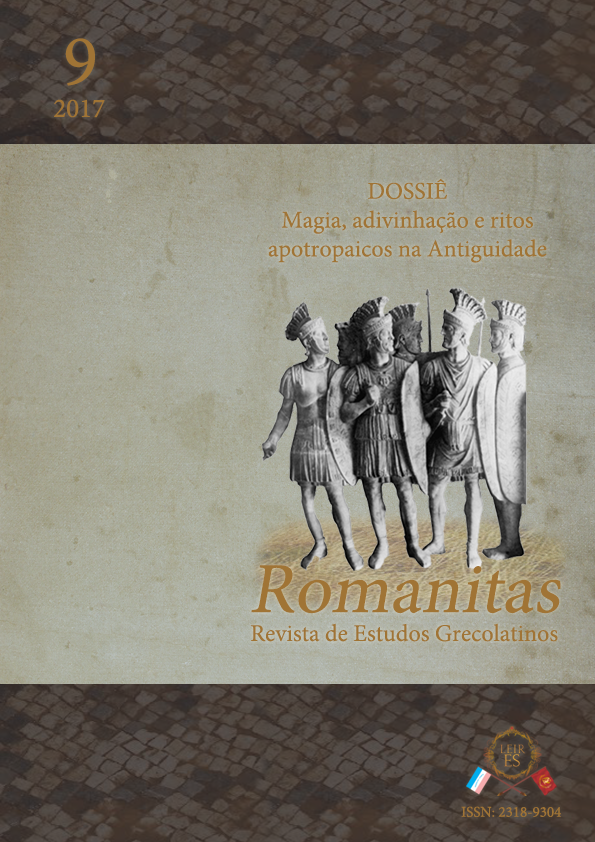The Pauline discourse and the representations of Roman Slavery in the First Century a.D.: a case study on the Epistle to Philemon
DOI:
https://doi.org/10.17648/rom.v0i9.18486Keywords:
Paleochristianity, Pauline Epistles, Philemon, Roman Slavery, Roman EmpireAbstract
The present article has the general objective of presenting the results obtained by the research developed by the Group of Studies in Classical History and History Teaching of the Graduate course of the Federal University of the State of Rio de Janeiro, UNIRIO. In it, we will analyze Pauline discourse and the representations of Roman slavery during the first century A.D. through the study of the Epistle of Philemon. To do so, we will investigate the plots of the text attributed to Paul and the subject of slavery in the ekklesía, from the key character of the epistolary text, namely, the slave Onesimus.
Downloads
References
Fonte textual
A BÍBLIA DE JERUSALÉM. Edição em língua portuguesa de Gilberto da Silva Gorgulho, Ivo Storniolo e Ana Flora Anderson. São Paulo: Paulus, 2002.
Obras de apoio
AGUIAR, A. T. Hiperbolismo e hermenêutica social: uma leitura sobre a inclusão social em Filemon. Hermenêutica, v. 9, n. 1, p. 63-75, 2010.
AMAYA, L. Concepções discursivas sobre o gênero epistolário em Roma. Principia, n. 31, p. 1-6, 2015.
ARENS, E. Ásia Menor nos tempos de Paulo, Lucas e João: aspectos sociais e econômicos para a compreensão do Novo Testamento. São Paulo: Paulus, 1997.
BRUCE, F. F. Paulo: o apóstolo da graça. São Paulo: Shedd, 2003.
CALLADO, C. S. A heterogeneidade das concepções cristãs do primeiro século: a contribuição de Paulo e a formação das ‘Ekklesiai’. Revista Jesus Histórico, v. 14, p. 102-112, 2015.
CARDOSO, C. F. Trabalho compulsório na Antiguidade. Rio de Janeiro: Graal, 1984.
CARDOSO, C. F; ARAÚJO, S. R. R. A. Sociedade romana no Alto Império. In: SILVA, G. V.; MENDES, N. M. (Org.) Repensando o Império Romano: perspectiva socioeconômica, política e cultural. Rio de Janeiro; Vitória: Mauad; Edufes, 2006, p. 85-108.
CHEVITARESE, A. L.; JUSTI, D. B. Identidades e relações de poder nos cristianismos originários: as cartas de Cícero e Paulo em perspectiva comparada. Antíteses, v. 8, p. 11-30, 2015.
CROSSAN J.; REED, J. Em busca de Paulo: como o apóstolo de Jesus opôs o Reino de Deus ao Império Romano. São Paulo: Paulinas, 2007.
FINLEY, M. Aspectos da Antiguidade. Rio de Janeiro: Martins Fontes, 1990.
HAWTHORNE, G. F.; MARTIN, R. P. ; REID, D. I. G. (Ed.). Dicionário de Paulo e suas cartas. São Paulo: Edições Loyola, 1997.
JOLY, F. D. Libertate opus est: escravidão, manumissão e cidadania à época de Nero (54-68 d.C.). Tese (Doutorado em História) – Programa de Pós-Graduação em História, Universidade de São Paulo: São Paulo, 2011.
JOLY, F. D. A escravidão na Roma Antiga: política, economia e cultura. São Paulo: Alameda, 2005.
JOLY, F. D. Estoicismo e escravidão no pensamento de Sêneca. Phoinix, v. 13, p. 98-114, 2007.
JOLY, F. D. Terra e trabalho na Itália no Alto Império. In: SILVA, G. V.; MENDES, N. M. (Org.) Repensando o Império Romano: perspectiva socioeconômica, política e cultural. Rio de Janeiro; Vitória: Mauad; Edufes, 2006, p. 65-84.
JUSTI, D. B. Imposição e negociação de fronteiras nos cristianismos originários: a magia dos homens divinos e dos apóstolos paleocristãos. Revista Jesus Histórico, v. 8, p. 11-31, 2012.
MACHADO, J.; FUNARI, P. P. A. Os manuscritos do Mar Morto: uma introdução atualizada. São Paulo: Annablume, 2012.
MOORE, C. O marxismo e a questão racial: Karl Marx e Friedrich Engels frente ao racismo e a escravidão. Belo Horizonte: Nandyala, 2010.
THÉBERT, Y. O escravo. In: GIARDINA, A. (Org.). O homem romano. Lisboa: Presença, 1992, p. 119-145.
VASCONCELLOS, P. L.; FUNARI P. P. A. Paulo de Tarso: um apóstolo para as nações. São Paulo: Paulus, 2013.
VEYNE, P. História da vida privada: do Império Romano ao Ano Mil. São Paulo: Companhia de Bolso, 2009. v. 1.
Downloads
Published
How to Cite
Issue
Section
License
Copyright (c) 2017 Romanitas - Revista de Estudos Grecolatinos

This work is licensed under a Creative Commons Attribution-NonCommercial-NoDerivatives 4.0 International License.
a. The authors retain copyright and grant the journal the right to first publication.
b. The authors are authorized to assume additional contracts separately, for non-exclusive distribution of the version of the work published in this journal (e.g., publishing in institutional repository or as a book chapter), with acknowledgment of authorship and initial publication in this journal.
c. Authors are allowed and encouraged to publish and distribute their work online (e.g. in institutional repositories or on their personal page) after the first publication by the journal, with due credit.
d. The journal's texts are licensed under a CC BY 4.0 Deed Attribution 4.0 International Licence (CC BY).




























